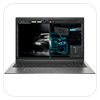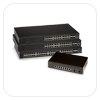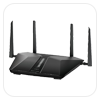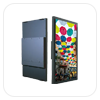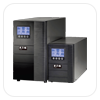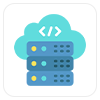
Companies have to make crucial decisions when they’re attempting to secure their digital boundary. Should they apply the raw power of a hardware firewall, or the dynamic integration of a software firewall?
Both essentially serve as doors to reject unwanted entry, regulating outside world network traffic. Having knowledge of their difference is of prime significance to a business so that it can strategically choose one over the other in relation to its own security needs, financial limitations, and technological capabilities.
In simple terms, software and hardware firewalls work by checking network traffic against a predetermined set of rules. When a data packet enters or exits a firewall interface, it is inspected against the set of rules, which may be matched based on various criteria such as source IP address, destination IP address, port number, protocol, and application-layer content. If the packet conforms to the “allow” rules that have been configured in the firewall, it passes; if it conforms to “deny” rules, the firewall drops the packet, thereby preventing malicious intrusions or data exfiltration.
Deployment of this feature differs greatly from one category of firewall to another. A hardware firewall is a real device, a separate appliance specifically created and built for network protection. It even has its own security operating system, with processing power and memory dedicated to the singular task of inspecting and screening network traffic. There are several advantages that come from this single-purpose design.
Conversely, the software firewall is made up of several software programs that execute on a computer operating system. For its security features, it utilizes the resources of the host machine: CPU, RAM, and NIC. Although this is sufficient to pay for a measure of protection, the fact that it must share resources and run on top of another operating system makes it susceptible to a couple of limitations.
| Feature | Hardware Firewall | Software Firewall | Winner |
| Core Functions | Dedicated appliance for network traffic inspection and filtering. | Installed on an operating system to filter traffic at the host level. | Tie |
| Performance/Throughput | High-performance, optimized for high-speed traffic processing. | Dependent on the host machine’s resources, it can degrade performance under load. | Hardware Firewall |
| Security & Resilience | Runs on a dedicated OS; isolated from general-purpose vulnerabilities.
|
Depends on the host OS; it is more vulnerable to compromise and deactivation.
|
Hardware Firewall |
| Centralized Management | Typically includes robust tools for centralized control across networks. | May offer central control, but often less feature-rich, or requires third-party tools. | Hardware Firewall |
| Resource Consumption | Dedicated hardware—no impact on endpoint system resources. | Shares CPU, RAM, and network resources with other host processes. | Hardware Firewall |
| Ease of Deployment | Requires physical setup and network integration. | Quick to install on individual machines; no physical setup required. | Software Firewall |
| Initial Cost | Higher upfront investment for dedicated hardware. | Lower or no additional cost; often bundled with OS.
|
Software Firewall |
| Scalability | Built to scale with network growth; handles high-volume environments well. | Requires configuration on each device; scaling becomes cumbersome in large networks. | Hardware Firewall |
| Tamper Resistance | Physically isolated; harder to tamper with remotely. | Can be disabled if the host is compromised. | Hardware Firewall |
| Granular Control | Deep packet inspection and highly customizable policies | Typically supports basic filtering rules, may lack DPI features. | Hardware Firewall |
| Visibility & Logging | Advanced, centralized logging and monitoring capabilities. | Logging varies by OS and configuration; it may be limited or decentralized. | Hardware Firewall |
| Best Suited For | Ideal for businesses and organizations needing strong network security. | Best for individuals or small setups with limited security demands | Hardware Firewall |
Performance and Throughput: The Speed Advantage
Taking the lead in performance capacity, hardware firewalls handle network traffic at a much greater throughput while handling at the maximum speed, so that bandwidth-intensive applications will not be taken hostage at any time. This is particularly for organizations requiring high-bandwidth communication, such as e-commerce, media streaming, or large data transfer. The assumed processing ability frees up the firewall to undertake packet filtering and inspection at the best possible speed, such that it is impossible to create a bottleneck on the network.
In contrast, software firewalls use a lot of the host’s CPU time. The greater the network traffic, the longer the firewall takes to process, and thus, the speed of other operations could be reduced. Such an overhead speed is far more unacceptable to any server that performs important business operations, or even to any workstation running heavyweight applications.
In the Security and Resilience Arena: Dedicated Security
Due to their commitment, hardware firewalls become more secure and robust. Because they run on their own operating system, independent of the general-purpose OS of a server or workstation, they are more difficult to breach by an attack directed towards the underlying system. If an attacker is able to break into a workstation only defended by a software firewall, they will likely be able to disable or bypass that firewall.
Being physically isolated from other machines and usually in a safe location, hardware firewalls are very resistant to physical tampering. The single-purpose OS is essentially stripped down and hardened against security risks, thereby eliminating any chance of security intrusion. Having this configuration provides greater levels of defense because of the built-in segregation and single-purpose functional attitude towards security at play.
Centralized Management and Scalability: Security Simplified
For an enterprise that has a number of devices across a complex network infrastructure, centralized management is absolutely necessary. Most hardware firewall solutions provide quite advanced interfaces that administrators employ to configure and observe security policies across the whole network from a single point. This simplifies security administration, implements the policy consistently, and eliminates the necessity of executing loads of administrative tasks regarding software firewall configuration on every device.
Although there are some centralized management abilities offered by software firewalls, it is not up to the level of granular control with a complete view that is provided by specialized hardware firewall management systems. Thereafter, security would be very troublesome to scale with software firewalls in the sense that one would have to continue configuring and keeping up with each client endpoint as the number of devices increases. Hardware firewalls can quite possibly scale more to company growth since they are network-wide, security-focused.
Cost Considerations: Initial Investment vs. Long-Term Value
At first, the hardware firewalls are more expensive than software firewall subscriptions. This entry cost can burden the minds of smaller organizations with tight budgets. But viewed as an investment, hardware firewalls will pay off in the long run through committed performance and better security, thereby preventing costly data breaches, reducing downtime, and saving administrative expenses.
Software firewalls don’t provide this choice; their lower initial expense entails more of a day-to-day maintenance on the admin’s side, and they might slow down performance from the machines they run on, necessitating, ultimately, a hardware upgrade. The expense of recovering from a successful cyberattack, which a strong hardware firewall can prevent, well exceeds the upfront investment in a dedicated security appliance.
Suitability for Different Business Sizes and Needs
Ultimately, it will be the size and the requirements of the companies that will decide the ideal option between a hardware and software firewall.
-
Startups and Small Businesses:
Ultra-small businesses that have a modest number of machines and less demanding network needs are probably best handled with a software firewall when set up and managed correctly. As organizations grow and become more reliant on networks, the limitations of software firewalls, such as reduced performance, lack of centralized control, and weaker overall security, can become significant drawbacks. Even small businesses handling sensitive customer information will gain much from having a simple hardware firewall as an extra layer of protection.
-
Medium-Sized Businesses:
In most cases, medium-sized businesses with extensive network infrastructures and plenty of network traffic will significantly benefit from a hardware firewall, performance-wise, centrally managed, and secure. Having the ability to segment their network, apply granular access control policies, and observe traffic on their digital footprint becomes very important.
-
Large Enterprises:
For big companies with complex network architecture and high-bandwidth demands, with very stringent security, an indispensable hardware firewall is in their security architecture. An enterprise can install several hardware firewalls in geographically differentiated network zones to achieve high availability and tiered security.
Hybrid Approach: Benefiting from Both
Something to keep in mind is that the decision between a hardware and a software firewall is not necessarily an either-or situation. A layered security strategy usually entails installing both kinds of firewalls for complete protection. This hardware firewall on the network perimeter is the first line of defense, blocking malicious traffic before it even reaches the internal network. At every endpoint, a secondary layer of defense through software firewalls is provided to guard against attacks penetrating the perimeter or originating inside the network. Thus, defense-in-depth enhances security by addressing threats at multiple levels.
Conclusion: Investing in Robust Network Security
From the conclusion, we understand that software firewalls provide some level of protection and need to be taken seriously by any genuine business that wants to guard its information and ensure business continuity, now that cyber threats are rapidly developing. Any real danger and security necessitate the second-line defense mechanism of a hardware firewall with undefined management and scalability, for it is what significantly makes it more robust.
Although an initial big investment may be needed, the advantages created due to the evasion of severe cyber threats, thereby pushing the computer-based environment to inefficiency, outweigh the cost of investment considerably.
A simple hardware firewall is a giant leap forward in security for a small business, as opposed to using software firewalls alone. Hardware firewalls are now great to use with enterprise networks due to the diversity in size and the increased complexity of those networks.






































































